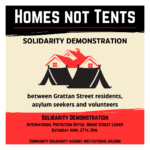The Government has announced its path to reopening the economy. It says there are key issues that will determine government decision making in relation to removing restrictions but none of them mention worker safety. On May 1st, nine weeks after the first case of Covid 19, it is announced that a National Protocol is being agreed with unions and employers in relation to workplace safety
Over the last nine weeks it has become clear that no state agency is responsible for enforcing Covid19 guidelines in workplaces. Solidarity-PBP TDs have been pursuing this issue relentlessly. On April 27th, Heather Humphries told them that 121 workplace complaints in relation to Covid 19 had been made to the Health and Safety Authority. These have been followed-up “with individual employers to ensure that those employers are fully aware of the relevant public health information and advice”. No mention of inspections, no mention of penalties, no mention of closing these places down.
TDs were previously told that the HSA did not have power to enforce public health guidelines. Cases should be referred to the Environmental Health Service of the HSE. But when Paul Murphy referred the Keelings case to the HSE, he was told that the HSE Environmental Health Service has no statutory role in inspecting employee accommodation or workplace health and safety. The Workplace Relations Commission ceased on-site inspections on March 13. The Minister for Justice has told Brid Smith TD that the Gardai can’t enforce social distancing in workplaces. Yet they can break up protests by Debenhams workers fighting for their jobs.
This is criminal because those who are working are not safe.
Between April 19th and April 27th, there was a 75% increase in workplace-related clusters. There are now 28.
MANDATE reported on April 23rd that almost half of workers said social distancing was not being adhered to in supermarkets and almost a third said they have insufficient PPE. 9% said a colleague had been infected.
In meat plants the situation is a lot worse with 120 of 350 workers at the Rosderra Meats plant in Roscrea, testing positive. It’s still open. The Guardian spoke to a worker who said “people are on top of each other, it’s like a cattle mart”. On April 30th the Minister for Agriculture confirmed there were six clusters of infection in meat plants.
The Migrants Rights Centre has been raising concerns about meat plants since late March saying that “We are concerned that some employers are intensifying their rate of production in anticipation of closure”.
So we should be wary of attempts to shift the debate from eliminating the risks from Covid 19 to one of a resumption of business at the behest of employers. What employers want is to get as many back to work as quickly as possible. In a remarkable interview on, April 25th , IBEC’s Danny Mc Coy, said “the term “essential” might not be appropriate when it comes to reopening Ireland. One criteria [for reopening] would be that labour-intensive industries would become more essential to get people back to work…. The idea of getting mass groups back to work, while it might seem counter-intuitive from a public health dimension, is very important for the economic problem we have.”
Well it is counter-intuitive, because it is only by limiting population density can social distancing be facilitated. Given what we know about the propensity of Covid 19 to kill older workers and those with underlying conditions or who are overweight a generalised reopening in the South will put significant numbers of workers at risk given that the employment rate for older worker is twice the EU rate; over one in ten workers are over 60; the death rate for respiratory diseases is the 4th highest in the EU ; and 66% of men are overweight or obese.
So what employers are proposing is a significant reopening which will put large numbers of workers at risk, adding to those who are already at risk.
It is up to workers to insist that their lives be prioritised and defend workplaces closures until their safety can be guaranteed. As the drive for profits continues unabated in some industries workers have to be put the brakes on. The fear must be that with reopening companies will seek to make up lost ground and push for accelerated production. In this context workers who believe their safety is being put at risk should walk off the job. The Safety, Health and Welfare at Work Act 2005 (Section 27(3) (f) basically says you don’t have to stay at work if your safety is at risk and employers cannot penalise you if you walk out.
It says
“An employer shall not penalise or threaten penalisation against an employee in circumstances of danger which the employee reasonably believed to be serious and imminent and which he or she could not reasonably have been expected to avert, leaving (or proposing to leave) or, while the danger persisted, refusing to return to his or her place of work or any dangerous part of his or her place of work, or taking (or proposing to take) appropriate steps to protect himself or herself or other persons from the danger.”
DON’T WORK IF IT IS NOT SAFE – WALK OUT IF UNSAFE












